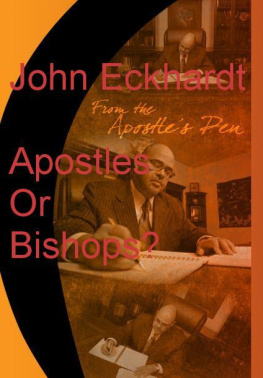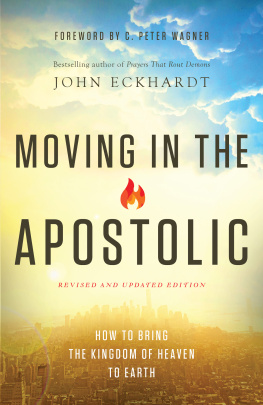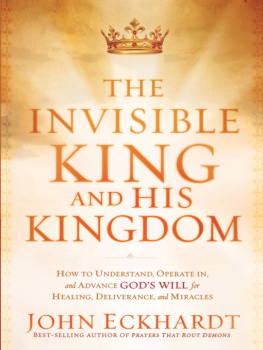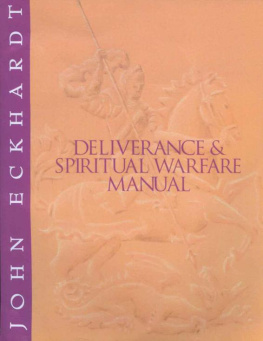John Eckhardt - Apostles Or Bishops
Here you can read online John Eckhardt - Apostles Or Bishops full text of the book (entire story) in english for free. Download pdf and epub, get meaning, cover and reviews about this ebook. genre: Religion. Description of the work, (preface) as well as reviews are available. Best literature library LitArk.com created for fans of good reading and offers a wide selection of genres:
Romance novel
Science fiction
Adventure
Detective
Science
History
Home and family
Prose
Art
Politics
Computer
Non-fiction
Religion
Business
Children
Humor
Choose a favorite category and find really read worthwhile books. Enjoy immersion in the world of imagination, feel the emotions of the characters or learn something new for yourself, make an fascinating discovery.
- Book:Apostles Or Bishops
- Author:
- Genre:
- Rating:4 / 5
- Favourites:Add to favourites
- Your mark:
- 80
- 1
- 2
- 3
- 4
- 5
Apostles Or Bishops: summary, description and annotation
We offer to read an annotation, description, summary or preface (depends on what the author of the book "Apostles Or Bishops" wrote himself). If you haven't found the necessary information about the book — write in the comments, we will try to find it.
Apostles Or Bishops — read online for free the complete book (whole text) full work
Below is the text of the book, divided by pages. System saving the place of the last page read, allows you to conveniently read the book "Apostles Or Bishops" online for free, without having to search again every time where you left off. Put a bookmark, and you can go to the page where you finished reading at any time.
Font size:
Interval:
Bookmark:
APOSTLES OR BISHOPS?
By John Eckhardt

Introduction
With the current restoration of apostles to the Church there is a corresponding restoration of New Testament terminology. As I travel around the world emphasizing this current restoration,
I am often asked the difference between apostles and bishops. There is some confusion concerning these two terms that needs to be resolved. Many leaders are opting to use the term "bishop in describing their ministry. Some have even gone as far as using the term archbishop. Some are opting for the term "apostle.
Some will contend that any term is irrelevant. However words and terms are very important in helping us understand truth. Wrong terminology can actually hinder people from understanding important truths that the Holy Spirit is restoring to todays church.
This is true with the historical use of the word missionary. Peter Lyne states The church for generations has used the term missionary to identify those sent out to foreign lands to plant and establish new churches. The Antioch model shows us the importance in releasing apostles for the planting and establishing of new churches. The events of Acts 13:1-4 have profound implications for the church today. So often we have sent the wrong people. At the heart of the church in Antioch was a team of prophets and teachers, but out of this group of five men the Holy Spirit singled out Barnabas and Saul for the wider work of evangelism and church planting. That these men were foundational to the establishing of the church in Antioch is without question. Their intensive program of teaching was a vital key to the development of the church. The contrast with contemporary church life is this. Had they been involved in any one of our churches today, they would have quickly become indispensable! New titles would have to be discovered, like senior pastor, to identify the importance of their role, and before long, their giftedness would become the cork in the bottle, preventing other gifts and ministries from developing. To cope with this dilemma, a name change has been inevitable. Apostles are now missionaries, the latter word coming from a Latin derivative, but essentially meaning the same thing. Some will feel that what I am saying here is simply semantics and of no particular importance. HOWEVER, WORDS ARE SYMBOLS OF IDEAS, AND A CHANGE OF NAME HAS SO OFTEN BROUGHT WITH IT A CHANGE IN UNDERSTANDING AND FUNCTION. A RETURN TO NEW TESTAMENT TERMINOLOGY COULD LEAD TO A REDISCOVERY OF APOSTOLIC PRIORITIES AND EFFECTIVENESS.
I agree wholeheartedly. Think of the difference between what comes to your mind when you hear the word APOSTLE to hearing the word MISSIONARY. There is a marked difference. Although both words mean essentially the same thing (a sent one), the word apostle carries a higher degree of authority. We expect more from apostles than we do from missionaries. The church is built upon the foundation of apostles, not missionaries (Eph.2:20). Although many missionaries were and are apostolic, many were and are not. Since many in the church have historically taught that there were nor more apostles after the apostolic age , we needed to replace their ministry with missionaries.
The word apostle is mentioned over seventy times in the New Testament. It is used more than any of the other ministry gifts. It is obvious that the Holy Spirit uses this word so often to emphasize the priority of the apostles ministry. It is the most important and primary gift in the church. This does not mean that we dont need the other gifts. They are also important. The apostle however is set in the church FIRST by God (1 Cor.12:28).
The word PASTOR is mentioned only once in the King James New Testament (Eph.4:11). How is it that a ministry that is listed once gets more priority in most churches than a ministry listed over seventy times? Our tradition has kept us from emphasizing the ministry that the Holy Spirit has emphasized in the Word of God. Some believers and churches are afraid to use the term APOSTLE. But it is a New Testament word that describes the most important and up-front ministry in the church. We cannot be afraid to use New Testament terminology.
Which things we also speak, not in the words which mans wisdom teacheth , but which the Holy Ghost teacheth ; comparing spiritual things with spiritual (1 Cor.2:13)
The ASV says "combining things with spiritual words. In other words the Holy Spirit gives us spiritual words to help us understand spiritual things. The word APOSTLE is a spiritual word that helps us understand a SPIRTUAL ministry. No other word can adequately describe this ministry.
In order to understand what the Holy Spirit is doing today we need to understand this word. We cannot be afraid of it. We cannot be blinded by tradition that limits this ministry to twelve. Unfortunately there are many leaders today who dont understand this word. They are afraid to use it, or will substitute other words to replace it. But the fact remains that Jesus gave APOSTLES (Eph.4:11). If leaders dont understand and have a revelation of the term APOSTLE, how can the Body of Christ as whole understand this ministry? If the church does not understand this word and gift, how can believers place a demand on this anointing and receive fully from this gift?
The word BISHOP is found four times in the King James New Testament. Again the word apostle is found over seventy times. You do the math. Which ministry is emphasized more by the Holy Spirit? In addition to these numbers the term bishop has had a history of misuse. It has presently come to mean something that it never meant in the early church. Because of this the church has suffered in its understanding of apostolic ministry. This is unfortunate because the apostles ministry is much needed today.
The Holman Bible dictionary gives an excellent definition of the term BISHOP:
The English word "bishop is the normal translation of the Greek noun episcopas , which occurs five times in the New Testament (Acts 20:28; Philem. 1:1; 1 Tim 3:2; Titus 1:7; 1 pet.2:25)...
Paul, addressing the Ephesian "elders, reminded them that the Holy Spirit made them "overseers ( episcopous ) "to feed (verb which is cognate to the noun "pastor) the church of the Lord. From this many conclude that in Pauls time "elder, "bishop, and "pastor were terms used to describe three different functions of the same Christian leader, not three distinct ministerial offices. Moreover, according to Phillipians 1:1 the church at Phillipi had more than one bishop. During the second century A.D. churches came to have a single bishop, and then that bishop came to exercise oversight over nearby rural churches as well as the city church so that his ecclesiastical territory became known as a "diocese or "see ("eparchy in the East). Bishops of churches that have been founded by apostles were said to be in succession to the apostles, and hence their teachings were held to be authentic and their authority collegial. By 400 A.D. in the West, the bishop of Rome began to assume extraordinary authority over other bishops. Today the Roman Catholic Church, the Eastern Orthodox churches, the Old Catholic Church, the Anglican Communion, and the (Lutheran) Church of Sweden teach the doctrine of apostolic (or Episcopal) succession.
Vines Dictionary defines bishop as follows : EPISCOPAS, lit., an overseer ( epi , over, skopeo , to look or watch), whence Eng. "bishop, which has precisely the same meaning, is found in Acts 20:28; Phil.1:1; 1 Tim.3:2; Tit.1:7; 1 Pet.2:25. Note: Presbuteros , an elder, is another term for the same person as bishop or overseer. See Acts 20:17 with verse 28. The term "elder indicates the mature spiritual experience and understanding of those so described; the term "bishop, or "overseer, indicates the character of his work undertaken. According to the Divine will and appointment, as in the N.T., there were to be bishops in every local church, Acts 14:23; 20:17; Phil.1:1; Tit.1:5; Jas.5:14.
Font size:
Interval:
Bookmark:
Similar books «Apostles Or Bishops»
Look at similar books to Apostles Or Bishops. We have selected literature similar in name and meaning in the hope of providing readers with more options to find new, interesting, not yet read works.
Discussion, reviews of the book Apostles Or Bishops and just readers' own opinions. Leave your comments, write what you think about the work, its meaning or the main characters. Specify what exactly you liked and what you didn't like, and why you think so.


















